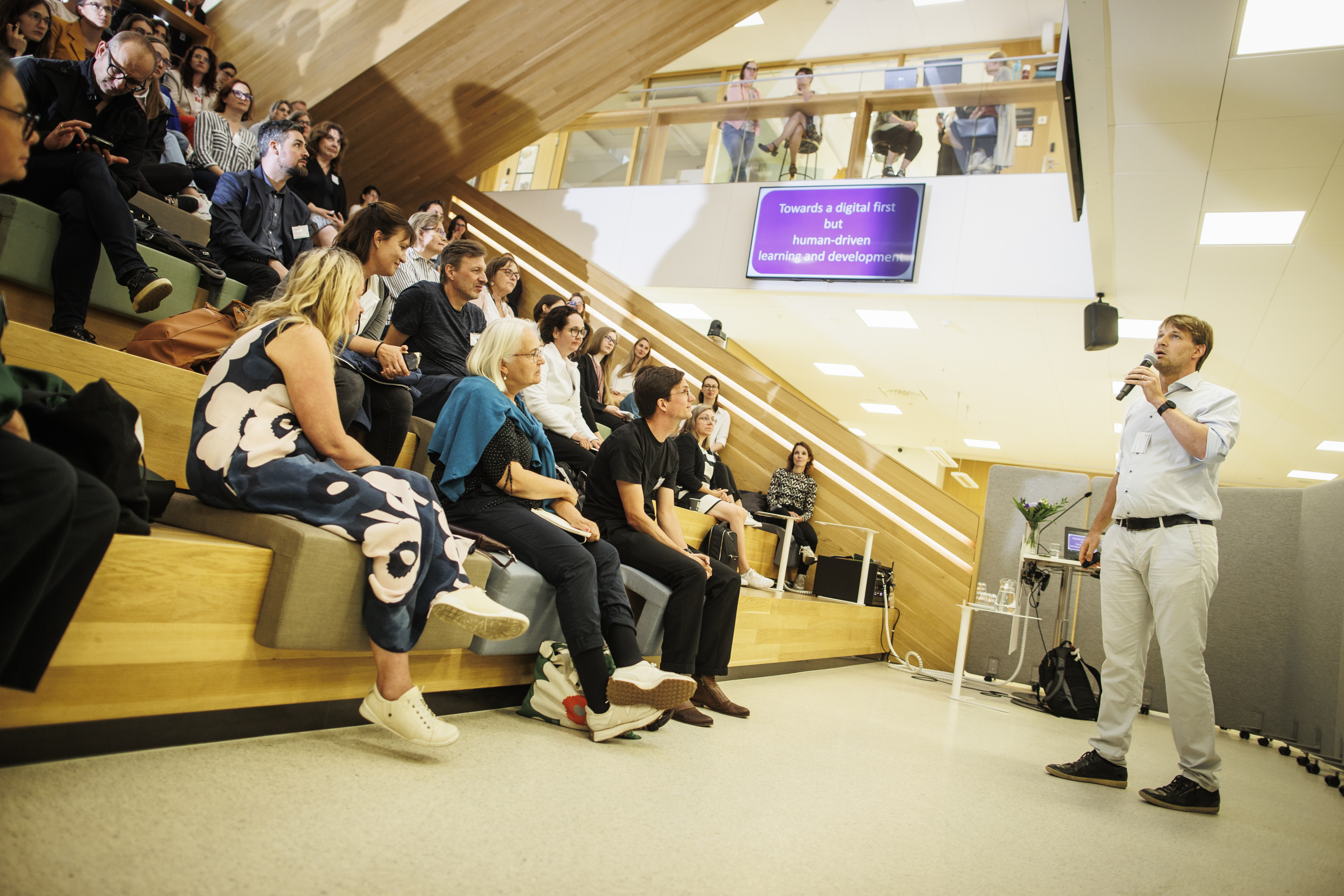


Prof. Dr. Bram De Wever is a professor in the field of learning and instruction at the Department of Educational Studies at Ghent University. His research is focusing on technology enhanced learning and instruction, peer assessment and feedback, computer-supported collaborative learning activities, and inquiry learning in higher education.
Bram finished his PhD on scripting collaboration in online discussion groups in 2006 and has been focusing on technology enhanced learning research ever since. From 2007 he was a post-doc research fellow at the Research Foundation Flanders (FWO) and in 2010 he got a tenure track position on Learning and Instruction at Ghent University. In 2015 he was appointed associate professor.
CSCL, computer supported collaborative learning, TEL, Technology Enhanced Learning, Asynchronous Discussion Groups
ALO! Project: Adult Learners Online
The project 'Adult Learners Online! Blended and Online Learning in Adult Education and Training' (ALO!) has a four-fold mission:
Ruth's PhD project contributes to the second goal or mission: the development of guidelines (at course level) to design a blended learning environment.
Abstract.
The shift to a knowledge society has transformed the way we live and work, which is especially challenging to adults with low education levels. Adult education could be the answer, but low-educated adults participate least in adult education. The present study uses data from the Programme for the International Assessment of Adult Competencies to investigate participation needs and barriers of low-, medium- and high-educated adults across 15 European countries (N = 20,593). Descriptives show that low-educated adults report the lowest need for training to exercise their job and indicate to be the least prevented from taking more training because of experienced barriers. We then analysed which barriers non-participating and participating adults were referring to. While medium- and high-educated non-participants indicate being prevented because of work and family responsibilities, low-educated non-participants chose family responsibilities but mainly and remarkably the option ‘other’ as their most important barrier. Contrary to medium- and high-educated adults, low-educated adults’ most important barrier could not be defined. A possible explanation is that they experience more dispositional barriers (such as bad memories of education or low self-esteem), which were not included in the list. Our results point to the importance of targeting low-educated adults in participation research.
Keywords.
Barriers, PIAAC, adult education, low-educated adults, Europe
Abstract.
Criticizing the common approach of supporting peer assessment through providing assessors with an explication of assessment criteria, recent insights on peer assessment call for support focusing on assessees, who often assume a passive role of receivers of feedback. Feedback requests, which require assessees to formulate their specific needs for feedback, have therefore been put forward as an alternative to supporting peer assessment, even though there is little known about their exact impact on feedback. Operationalizing effective feedback as feedback that (1) elaborates on the evaluation and (2) to which the receiver is agreeable, the present study examines how these two variables are affected by feedback requests, compared to an explanation of assessment criteria in the form of a content checklist. Situated against the backdrop of a writing task for 125 first-year students in an educational studies program at university, the study uses a 2 x 2 factorial design that resulted in four conditions: a control, feedback request, content checklist, and combination condition. The results underline the importance of taking message length into account when studying the effects of support for peer assessment. Although feedback requests did not have an impact on the raw number of elaborations, the proportio n of informative elaborations within feedback messages was significantly higher in conditions that used a feedback request. In other words, it appears that the feedback request stimulated students to write more focused messages. In comparison with feedback content, the use of a feedback request did, however, not have a significant effect on agreement with feedback
Keywords.
peer assessment, feedback request, feedback content, agreement with feedback
Abstract.
The design of blended learning environments brings with it four key challenges: (1) incorporating flexibility, (2) stimulating interaction, (3) facilitating students’ learning processes, and (4)
fostering an affective learning climate. Seeing that attempts to resolve these challenges are fragmented across the literature, a systematic review was performed. Starting from 640 sources, 20 studies
on the design of blended learning environments were selected through a staged procedure based on the guidelines of the PRISMA statement, using predefined selection criteria. For each study, the instructional
activities for dealing with these four challenges were analyzed by two coders. The results show that few studies offer learners control over the realization of the blend. Social interaction is generally
stimulated through introductory face-to-face meetings, while personalization and monitoring of students’ learning progress is commonly organized through online instructional activities. Finally, little
attention is paid to instructional activities that foster an affective learning climate.
Keywords.
Instructional activities; blended learning; educational technology; course design
Abstract.
The present study explores secondary school history teachers's knowledge of inquiry methods. In order to do so, a process model, outlining 5 core cognitive processes of inquiry in the history class room, was developed based on a review of the literature. This process model was then used to analyze think-aloud protocols of 20 teachers' reasoning during an inquiry task. It was found that less than half of the teachers used all cognitive processes during the inquiry. Based on the results, a distinction can be made between an integral, fragmentary and cursory approach to inquiry. Further analysis suggest that there exists no clear pattern in the relation
between teachers' beliefs about the subject of history and their approach to inquiry. The implications for teacher training are discussed, and outline how the process model could serve as an instructional tool that can contribute to a comprehensive training program for history teachers.
Keywords.
history education, inquir-based learning, teacher knowledge
Abstract.
The present study investigates a training program aimed at preparing pre-service history teachers for organizing inquiry-based learning (IBL) in class. This program consisted of a workshop and an assignment during the teaching internship period. Pre- and posttests indicate that the workshop had a significant effect on self-efficacy and attitude toward IBL, but also that most student teachers' attitudes had again changed after the assignment. Related to this, student teachers' lesson plans revealed three different templates, representing distinct interpretations of ’inquiry’. An analysis of reflection papers and interviews describes how the context of the teaching internship further shaped student teachers' thinking.
Keywords.
history education, inquiry-based learning, student teachers, teacher learning
Abstract.
Developing authentic learning environments in higher education calls for pedagogical
approaches to foster online collaborative learning. The main aim of this study was to
investigate the effect of a collaboration script for a wiki task. A collaboration script is a set of
instructions to improve collaboration between learning partners. Participants were first-year
university students in Educational Sciences (N=186) collaborating in groups of five during a
three-week period to create a wiki on peer assessment in education. Two conditions were
contrasted: a scripted and a non-scripted condition. The effect of scripting was measured in
four ways (questionnaires, log-file analyses, group product scores, and individual pre- post-
test scores). Results show significant positive effects of scripting with respect to the
collaborative group processes and students' feelings of shared responsibility. No significant
effects of scripting were found with respect to the developed wiki products. As for students'
individual learning outcomes, results showed a significant increase from pre- to post-test for
all students. Although the increase was higher in the scripted condition, the difference
between the conditions was not statistically significant.
Keywords.
Wiki, script, collaboration, collaborative learning
Abstract.
In this keynote lecture I will present my view on how important humans are – and will increasingly be – for guiding future learning and professional development. Given the theme of this SIG14 meeting 'Learning On-the-Go: Understanding the Dynamics of Continuous Professional Development in a Tech-Driven World' I thus decided to focus on ‘Human-Driven Learning and Development’.
In doing this, I will draw some parallels with technology-enhanced learning and instruction in higher education settings, focusing on challenges for developing online and blended learning environments and course design. I will make the point that we have been moving to a digital first type of education that is still human centered.
Both what technologies can bring to the table with regard to learning and professional development, as well as what human facilitators can bring to the table will be discussed, as well as competences needed for facilitating learning and professional development in an increasing digital world.
Based on PIAAC (Programme for the International Assessment of Adult Competencies, OECD) and related data I will also focus on differences regarding shorter and longer educated people, how they look at learning, and how we may need human-driven learning and professional development to ensure a broad spectrum of future opportunities for learning and development for all.
Conference.
EARLI SIG 14 Conference 2024 'Learning On-the-Go: Understanding the Dynamics of Continuous Professional Development in a Tech-Driven World'. https://www.jyu.fi/en/events/earli-sig14-conference-2024
Special Interest Group (SIG) 14 of the European Association for Research on Learning and Instruction (EARLI) is focusing on Learning and professional development. It brings together researchers who study work and education as contexts for professional learning.
Downloads.
 (Pdf Slides, 11010 kB)
(Pdf Slides, 11010 kB)
 Overview of presented papers
Overview of presented papers
Impression.

D-Teach Virtual Summit: Online en blended leren in het hoger onderwijs
Bram De Wever
Online in Coronatijden: Nieuwe tools en aanpakken? Of back to basics?
Agentschap Integratie en Inburgering
Bram De Wever
Online leren en instructie
Steunpunt Diversiteit & Leren
Bram De Wever
Online en blended leren
About.
Doctoral dissertation, defended on June 13, 2016.
About.
Doctoral dissertation, defended on September 27, 2018.
About.
Doctoral dissertation, defended on September 11, 2019.
About.
Doctoral dissertation, defended on March 27, 2020.
Overzicht van titels van masterproeven
Copyright © 2018 - All Rights Reserved - TECOLAB - Department of Educational Studies - Ghent University
Website by TECOLAB - Template by OS Templates